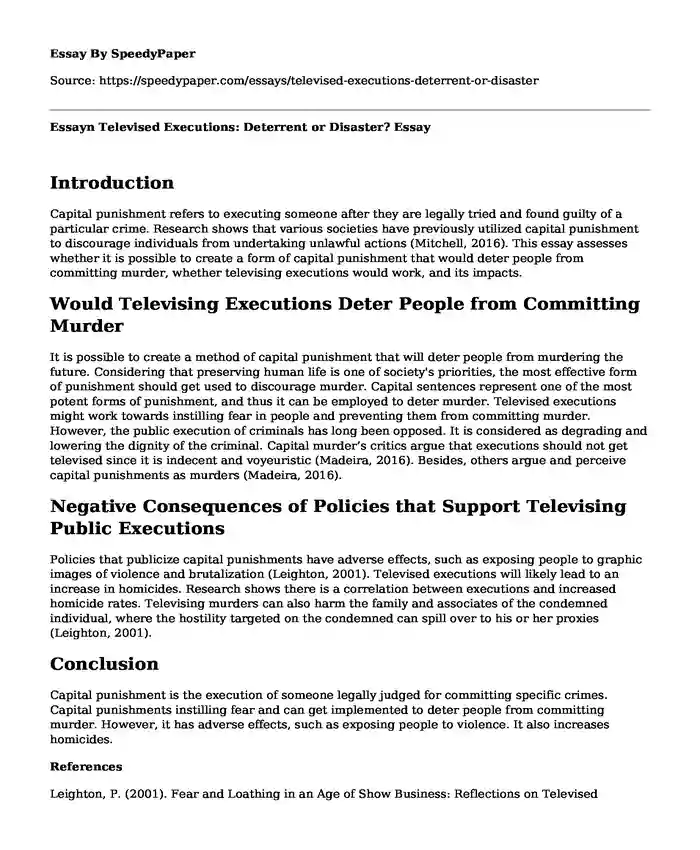
| Type of paper: | Essay |
| Categories: | Sociology Technology Punishment |
| Pages: | 2 |
| Wordcount: | 410 words |
Introduction
Capital punishment refers to executing someone after they are legally tried and found guilty of a particular crime. Research shows that various societies have previously utilized capital punishment to discourage individuals from undertaking unlawful actions (Mitchell, 2016). This essay assesses whether it is possible to create a form of capital punishment that would deter people from committing murder, whether televising executions would work, and its impacts.
Would Televising Executions Deter People from Committing Murder
It is possible to create a method of capital punishment that will deter people from murdering the future. Considering that preserving human life is one of society's priorities, the most effective form of punishment should get used to discourage murder. Capital sentences represent one of the most potent forms of punishment, and thus it can be employed to deter murder. Televised executions might work towards instilling fear in people and preventing them from committing murder. However, the public execution of criminals has long been opposed. It is considered as degrading and lowering the dignity of the criminal. Capital murder’s critics argue that executions should not get televised since it is indecent and voyeuristic (Madeira, 2016). Besides, others argue and perceive capital punishments as murders (Madeira, 2016).
Negative Consequences of Policies that Support Televising Public Executions
Policies that publicize capital punishments have adverse effects, such as exposing people to graphic images of violence and brutalization (Leighton, 2001). Televised executions will likely lead to an increase in homicides. Research shows there is a correlation between executions and increased homicide rates. Televising murders can also harm the family and associates of the condemned individual, where the hostility targeted on the condemned can spill over to his or her proxies (Leighton, 2001).
Conclusion
Capital punishment is the execution of someone legally judged for committing specific crimes. Capital punishments instilling fear and can get implemented to deter people from committing murder. However, it has adverse effects, such as exposing people to violence. It also increases homicides.
References
Leighton, P. (2001). Fear and Loathing in an Age of Show Business: Reflections on Televised Executions. Criminal Justice Ethics, 512-25. http://www.paulsjusticepage.com/paul/televised_executions.htm
Madeira, J. (2016). Capital punishment, closure, and media. In Oxford Research Encyclopedia of Criminology and Criminal Justice. https://oxfordre.com/criminology/view/10.1093/acrefore/9780190264079.001.0001/acrefore-9780190264079-e-20
Mitchell, J. F. (2016). Death Penalty Commentary Series: Capital Punishment and the Courts. Harv. L. Rev. F., 130, 269. https://heinonline.org/HOL/LandingPage?handle=hein.journals/forharoc130&div=33&id=&page=
Cite this page
Essayn Televised Executions: Deterrent or Disaster?. (2023, Nov 28). Retrieved from https://speedypaper.net/essays/televised-executions-deterrent-or-disaster
Request Removal
If you are the original author of this essay and no longer wish to have it published on the SpeedyPaper website, please click below to request its removal:
- Free Essay on Advantages and Disadvantages of Technology
- Free Essay on Methodologies of Software Development
- Paper Example. The Effects of Provincial Cuts on Ontario
- Free Essay Example - David Hewson
- Free Essay: Analysis of Gender Socialization
- Paper Sample on Data Collected on Children
- Shaping Education: Exploring the Pros and Cons of Online Classes - Essay Sample
Popular categories




